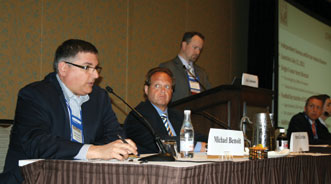Federal Reserve Temporarily Exempts Dealers from Certain Data Collection Requirements Under Regulation B

By subscribing, you agree to receive communications from Auto Remarketing and our partners in accordance with our Privacy Policy. We may share your information with select partners and sponsors who may contact you about their products and services. You may unsubscribe at any time.
WASHINGTON, D.C. –
The Federal Reserve confirmed Monday that automotive dealers are temporarily exempt from collecting and reporting information to the government on credit applications from women or minority-owned businesses and small businesses.
This requirement falls under Regulation B (Equal Credit Opportunity) and was added as a section under the Dodd-Frank Act.
“Although the Consumer Financial Protection Bureau generally will have the authority to issue rules to implement this provision of ECOA, the board retains authority to issue rules for certain motor vehicle dealers,” the Reserve Board said in a statement Monday.
“The CFPB previously announced that creditors are not obligated to comply with the data collection requirements until the CFPB issues detailed rules to implement the law. Consistent with the CFPB’s determination, the board is issuing a proposed rule to clarify that this approach also applies to motor vehicle dealers that are subject to the board’s jurisdiction,” the statement continued.
Basically, because the board reserves rule making authority for auto dealers, it issued this proposal to give itself some more time while it waits for the Consumer Financial Protection Bureau to develop.
The section requiring reporting on women or minority-owned businesses was set to become effective July 21, when rule making authority was to be transferred to the new protection board; however, since the new agency is still being created and remains in the process of developing rules, the Federal Reserve also put on the brakes.
Subscribe to Auto Remarketing to stay informed and stay ahead.
By subscribing, you agree to receive communications from Auto Remarketing and our partners in accordance with our Privacy Policy. We may share your information with select partners and sponsors who may contact you about their products and services. You may unsubscribe at any time.
While the proposal appears to be an effort by the board to clear up industry confusion, the public comment period expires July 29.
“Although the CFPB will have authority to issue rules to implement ECOA Section 704B for most entities, the board retains authority to issue rules for motor vehicle dealers covered by Section 1029(a) of the act. Thus, the board is responsible for issuing regulations to implement the amendments made by Section 704B for motor vehicle dealers covered by Section 1029(a) of the Dodd-Frank Act. Consequently, the board has received inquiries as to whether motor vehicles dealers will need to comply with the requirements of ECOA Section 704B before implementing regulations are issued.
“The board believes that detailed rules to implement ECOA Section 704B are necessary to ensure that data collected and reported under that provision are useful. The purposes of the statute are to facilitate fair lending enforcement and to identify business and community development needs and opportunities of women-owned, minority-owned and small businesses. To support sound analysis by the users of the data, it should be collected and reported in a consistent and standardized way. To achieve this, implementing rules can provide motor vehicle dealers with uniform definitions and standards that they can follow in collecting and reporting data.
“Accordingly, this proposed rule excepts motor vehicle dealers covered by Section 1029(a) of the Dodd-Frank Act from any obligation to comply with ECOA Section 704B until the board issues final regulations to implement that provision and those regulations become effective,” the Board of Governors for the Federal Reserve System said.
Ultimately, it appears the Federal Reserve plans to keep its rule-making guidance and definitions similar to what the Consumer Financial Protection Board comes up with. This means that much is on hold while the new agency continues to ramp up.
Dealers most expected to come under the gun of the bureau are buy-here, pay-here dealers. The new agency appears to be targeting the alternative financial services industry.
Michael Benoit, a Washington, D.C., partner with Hudson Cook, recently delved into what he’s been hearing about the new agency during the Below Prime Auto Financing Conference in Fort Worth.
According to Benoit, the government division can amend regulations but cannot write new rules until a director is confirmed.
Debate is still ongoing as to whether Elizabeth Warren, who came up with the idea for the bureau, will be installed as director or whether a board will be put in place.
Despite the fact that so much about the bureau is still unknown, Benoit did have some good things to say.
"I have been very impressed by the caliber of people hired for the consumer bureau," he pointed out.
He went through the list of names, pointing out that many are extremely knowledgeable in their areas of responsibility. He also stressed that auto finance does not appear to be a high priority for the new bureau.
"They’ve been doing a lot of recruiting but very little hiring," Benoit said of the bureau.
He noted that he walks by their offices in Washington, D.C., regularly, and that many of the bureau’s tech personnel are crammed almost on top each other in one room. They don’t appear to have room for a lot of hiring yet, he mentioned.
Benoit went on to say that the bureau executives seem to understand, "There are not the kinds of problems in auto finance as there are under credit cards or mortgages."
To comment on the proposed Federal Reserve rule or view its entirety, visit www.federalreserve.gov/newsevents/press/bcreg/20110620a.html.
To see a copy of Benoit’s PowerPoint presentation on the development of the new agency, visit http://nafassociation.com/events/1106presentations.html.


